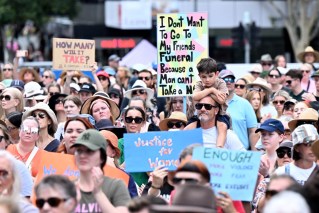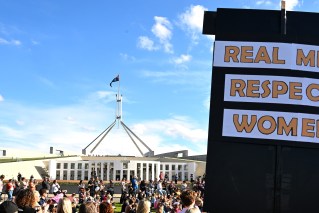Can Family Court help solve DVO disconnect?
The Family Court would have its own deaths investigation unit to help identify systemic failures under a Queensland proposal to help reduce domestic violence.

Queensland's State Coroner, Terry Ryan.
In the wake of the tragic quadruple murder suicide in the Brisbane suburb of Camp Hill last week, there are calls for more to be done to respond to early signs of violence and close any gaps in the system that leave people vulnerable.
The deaths of Hannah Clarke, 31, and her children Aaliyah, 6, Laianah, 4 and Trey, 3, and their killer Rowan Baxter, will be the subject of a Coronial inquest. The use of Domestic Violence Orders will come under scrutiny, after it was revealed Baxter had ignored police requests he stay away from his estranged wife. In one-third of all domestic homicides in Queensland, a DVO was in place.
The State Coroner, Terry Ryan, chairs a Domestic and Family Violence Death Review and Advisory Board that has previously guided changes to DVO arrangements.
In its latest report to the State Government, having reviewed the deaths of 24 women, children and men, the board has called for more resources to be provided to young mothers and their families experiencing or at risk of violence.
The board also recommended the Government “propose to the Council of Australian Governments that the Commonwealth of Australia implement an independent and appropriately resourced death review mechanism within the Family Court of Australia and the Federal Circuit Court of Australia”.
“This death review mechanism would facilitate learnings from the deaths of children, young people and parents known to the family court system at the time of their death or within appropriate proximity to their death with a view to prevent or reduce similar deaths in future,” the report states.
A spokesman for Queensland Attorney-General and Justice Minister Yvette D’Ath said the Government was considering the recommendations.
With federal Labor calling for another summit, and community organisations demanding a better approach, Prime Minister Scott Morrison today confirmed the broader issue would be on the COAG agenda.
“Countering domestic violence and dealing with family violence is a priority every day for my government,” Morrison said
“Not just on any one day. Every single day. Because every single day women are confronted, and children, with horrendous family violence. And so each and every day we are putting in place the plan, the fourth national action plan, a process that was actually started by the previous Labor government, and in a few weeks’ time COAG will be coming together again and this will be one of the many topics that will be on that agenda.”
At the suggestion of One Nation leader Pauline Hanson, who believes there is a systemic bias against men, a federal parliamentary committee is re-examining the family law system. After Hanson this week commented, in relation to the Camp Hill tragedy, that “these things happen,” Queensland’s Minister for the Prevention of Domestic and Family Violence Di Farmer called for Hanson to be dismissed as deputy chair of the inquiry.
The inquiry will next month hold public hearings in Townsville, Rockhampton and Brisbane.
The board noted the 320 domestic and family homicides in Queensland between July 2006 and June 2019. At the time of the report, covering the 2018-19 year, the board observed a possible sign of improvement because “in two of the past four years, fewer than 10 intimate partner homicides have been recorded in Queensland, a figure that had not been observed previously”.
Since Clarke and her children were murdered, a Townsville woman was allegedly murdered by a man in a domestic incident, while there have also been several suspicious child deaths.
Clarke and Baxter are not believed to have been involved in any Family Court proceedings but the system has previously been criticised for being unnecessarily adversarial and putting people under additional pressure.












